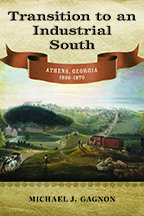
312 pages / 6.00 x 9.00 inches / 4 maps, 2 charts
Business / Labor History | History / United States - Southern History | Social Studies / Urban Studies
Renowned New South booster Henry Grady proposed industrialization as a basis of economic recovery for the former Confederacy. Born in 1850 in Athens, Georgia, to a family involved in the city’s thriving manufacturing industries, Grady saw firsthand the potential of industrialization for the region. In Transition to an Industrial South, Michael J. Gagnon explores the creation of an industrial network in the antebellum South by focusing on the creation and expansion of cotton textile manufacture in Athens.
“Gagnon’s research is solid and he is especially adept at making these men real through their memoirs, correspondence, personal papers, and the R. G. Dun and Company business records. . . . Gagnon’s book will further our understanding of the complexities of the southern urban economy before, during, and after the Civil War.”—Journal of American History
“Transition to an Industrial South by Michael J. Gagnon is a valuable addition to an expanding body of scholarship that, collectively, might be called the ‘new economic history’ of the Old South. . . . Richly detailed, Gagnon makes excellent use of an impressive variety of sources, and he deftly navigates between local, state, and national subjects and historiography. Innovative, challenging, and frequently entertaining.”—Business History Review
"Most of the book focuses on the antebellum period, as the author offers a detailed look at the political and economic motivation for industrialization and analyzes each social class associated with the manufacturing process. . . . There is no doubt that this book once again disproves the planter-class-domination and watershed theories put forward by Genovese and Woodward, respectively. . . . Gagnon's study of Athens is thorough, and it does provide further support to the argument that the antebellum south was not hostile to industrialization."—Faye L. Jensen, South Carolina Historical Magazine
“Gagnon’s solidly researched book will be of interest to scholars and students of southern industrialization and adds to a well-established body of scholarship clearly placing the antebellum South in the context of modern economic development.”—Journal of Southern History
“A superbly researched and finely written case study.”—H-Net
“[An] exhaustively researched study of Athens, Georgia. . . . Transition to an Industrial South is the result of years of painstaking research, but just as importantly, reflects years of thought about southern antebellum development.”—Georgia Historical Quarterly
“An interesting case study of a diverse antebellum South. . . . Impressively utilizing local newspapers, Gagnon highlights the men who promoted industry and brought mills to rural upcountry Georgia.”—American Historical Review
Found an Error? Tell us about it.